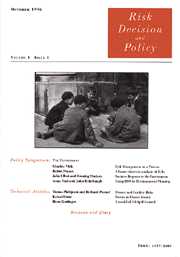Crossref Citations
This article has been cited by the following publications. This list is generated based on data provided by
Crossref.
Moore, Don A.
2005.
Not so Above Average After All: When People Believe They are Worse than Average and its Implications for Theories of Bias in Social Comparison.
SSRN Electronic Journal,
Weinstein, N D
Marcus, S E
and
Moser, R P
2005.
Smokers’ unrealistic optimism about their risk.
Tobacco Control,
Vol. 14,
Issue. 1,
p.
55.
Cerully, Jennifer L.
Klein, William M. P.
and
McCaul, Kevin D.
2006.
Lack of Acknowledgment of Fruit and Vegetable Recommendations Among Nonadherent Individuals: Associations With Information Processing and Cancer Cognitions.
Journal of Health Communication,
Vol. 11,
Issue. sup001,
p.
103.
Moore, Don A.
2007.
Not so above average after all: When people believe they are worse than average and its implications for theories of bias in social comparison.
Organizational Behavior and Human Decision Processes,
Vol. 102,
Issue. 1,
p.
42.
Gold, R S
2007.
Spontaneous comparisons with others in gay men's judgements of HIV risk.
International Journal of STD & AIDS,
Vol. 18,
Issue. 3,
p.
175.
Peretti-Watel, Patrick
Constance, Jean
Guilbert, Philippe
Gautier, Arnaud
Beck, François
and
Moatti, Jean-Paul
2007.
Smoking too few cigarettes to be at risk? Smokers’ perceptions of risk and risk denial, a French survey.
Tobacco Control,
Vol. 16,
Issue. 5,
p.
351.
Gold, Ron S.
and
Brown, Mark G.
2009.
Explaining the effect of event valence on unrealistic optimism.
Psychology, Health & Medicine,
Vol. 14,
Issue. 3,
p.
262.
Hevey, David
French, David P.
Marteau, Theresa M.
and
Sutton, Stephen
2009.
Assessing Unrealistic Optimism.
Journal of Health Psychology,
Vol. 14,
Issue. 3,
p.
372.
Renner, Britta
and
Schupp, Harald
2012.
The Oxford Handbook of Health Psychology.
p.
638.
Rose, Jason P
2012.
Debiasing comparative optimism and increasing worry for health outcomes.
Journal of Health Psychology,
Vol. 17,
Issue. 8,
p.
1121.
Gold, Ron S.
and
de Sousa, Phillip N.
2012.
When does event valence affect unrealistic optimism?.
Psychology, Health & Medicine,
Vol. 17,
Issue. 1,
p.
105.
Cho, Hichang
Lee, Jae-Shin
and
Lee, Seungjo
2013.
Optimistic Bias About H1N1 Flu: Testing the Links Between Risk Communication, Optimistic Bias, and Self-Protection Behavior.
Health Communication,
Vol. 28,
Issue. 2,
p.
146.
Twigg, O. C.
and
Byrne, D. G.
2015.
Perceived Susceptibility to Addiction among Adolescent Smokers.
Journal of Child & Adolescent Substance Abuse,
Vol. 24,
Issue. 5,
p.
235.
Ludolph, Ramona
and
Schulz, Peter J.
2018.
Debiasing Health-Related Judgments and Decision Making: A Systematic Review.
Medical Decision Making,
Vol. 38,
Issue. 1,
p.
3.
Drouin, Olivier
Winickoff, Jonathan P.
and
Thorndike, Anne N.
2019.
Parental Optimism About Children's Risk of Future Tobacco Use and Excessive Weight Gain.
Academic Pediatrics,
Vol. 19,
Issue. 1,
p.
90.

